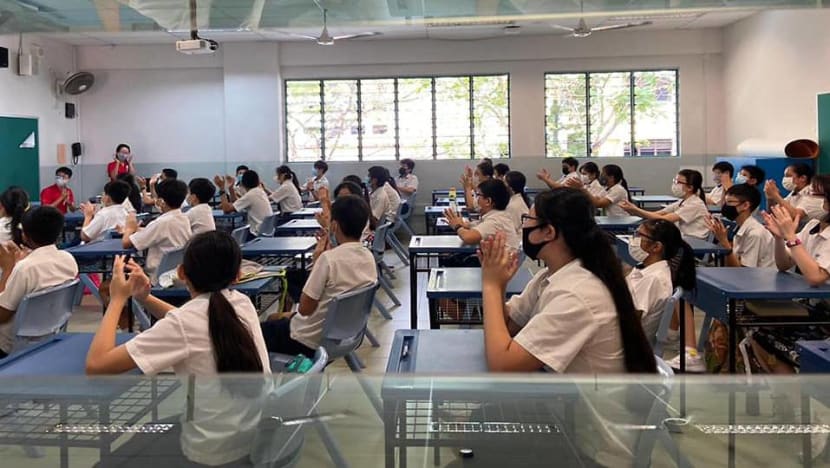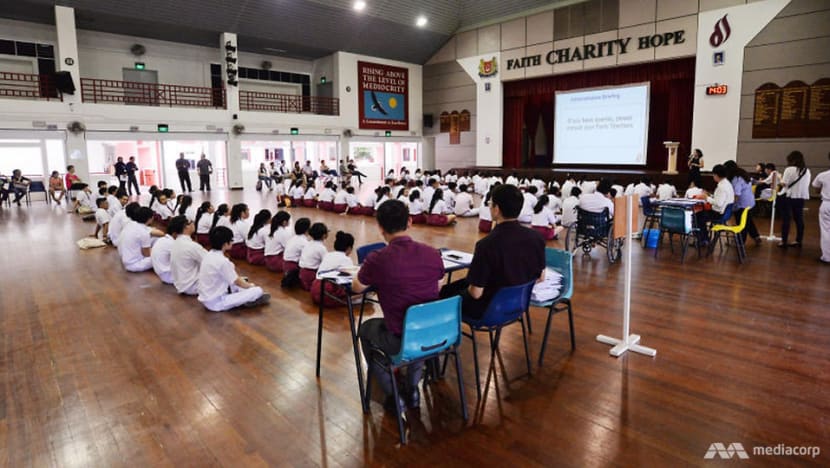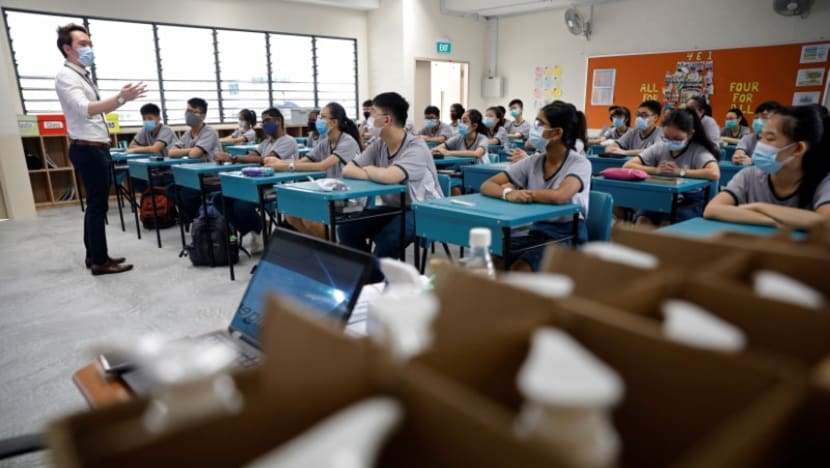commentary Commentary
Commentary: PSLE scores could impact life outcomes. So don’t let them
Where PSLE scores have been a high-stakes milestone for years, the shift towards subject-based banding (SBB) will change that. But SBB also has room for improvement in achieving this aim, says Kelvin Seah Kah Cheng.

A Primary 6 class from Unity Primary waiting to receive their PSLE results on Nov 25, 2020. (Photo: Facebook/Lawrence Wong)
SINGAPORE: Last month, the Primary School Leaving Examination (PSLE) results were released.
Every year, right around the time this happens, we often see people sharing stories on social or traditional media about how they didn’t quite do so well in the PSLE but nevertheless attained success in life.
Film-maker Royston Tan, for instance, has notably shared that he scored 168 for the exam, placing him in the normal stream. Today, however, he is a celebrated film-maker.
“You just have to give your best in whatever you do and believe that the dots will connect in the future”, he said in 2018.
Often, these stories go viral because of the feel-good vibes they create. The main message from these stories seems to be: Don’t take the PSLE scores too seriously. They do not define you.
Yet these stories would be challenged by netizens and criticised for being insensitive anecdotes which lack generalisability.
READ: Commentary: PSLE scores and the problem with the beloved late bloomer narrative
READ: Commentary: Life Beyond Grades a worthy cause but be careful not to trivialise failure
NOBODY KNOWS HOW MUCH IMPACT A DIFFERENT PSLE SCORE MIGHT HAVE HAD ON YOU
How Singaporeans have learnt to cope with this high-stakes exam has evolved over many years. In particular, there is a growing realisation that while grades shouldn’t define us, they do shape subsequent pathways.
One reason why PSLE scores still receive attention is because they do determine your course of study in secondary school. Less ideal grades may mean being tracked to a less demanding stream.
This could alter life outcomes since the type of education received (whether academic or vocational) and the peers one will encounter are different.
How different would your life be had you been tracked into a different stream? The people sharing their stories seem to argue it did not matter much, because despite doing badly in the PSLE and being tracked into a less demanding stream, they ended up in a well-paying job anyway.
But frankly, no one knows. You will never know what lies at the end of the road not taken.
Perhaps you might have enjoyed an even better job had you gone to a more demanding stream? Perhaps you might have encountered vastly different connections that would have led to down another career path?
WHY COMPARING OUTCOMES ACROSS STREAM IS PROBLEMATIC
Netizens often suggest that one way to tell if streaming has had an effect is to compare the outcomes of people who studied in different streams. For instance, compare the salaries of graduates from the express stream to those from the normal (academic) stream.
READ: Commentary: Streaming out. Subject-based banding in. How are parents reacting?
However, such comparisons are unlikely to reliably capture the effect of streaming. Graduates from the express and the normal streams are not the same to begin with.
They may differ, on average, in aspects like family income, parental education, innate ability, and more.
Consequently, part or even all of the difference in salary may be reflecting differences in these attributes, rather than the effect of streaming.
A more reliable approach to tell if streaming has made a difference would be to use what economists call a regression discontinuity design. This approach compares people who fall narrowly on both sides of some PSLE score which determines stream status.
For instance, suppose that students would qualify for the express stream only if they scored above or equal to a cut-off like 188 for the PSLE.
If so, we can compare the salaries of people who narrowly scored above 188 (and so managed to get into the express stream) to those who narrowly scored below (and so failed to get into the express stream).
READ: Commentary: We have totally undervalued late bloomers
Since people immediately on both sides of this fence are likely to be similar on average, any difference in salaries would be capturing the impact of being tracked into a different stream.
Such a study has yet been done in Singapore due to the lack of publicly available data. But there is value in pursuing it because it allows us to better understand the consequences of streaming and ability-based grouping in general.
BUT SUBJECT-BASED BANDING MAY CHANGE THAT
Such an exercise might have been overtaken by events given that Singapore will from 2024 be entering a new era where streaming will be replaced by subject-based banding (SBB).

One of the greatest merits of SBB is it retains the benefits of customised education - by ensuring students receive instruction in specific academic subjects tailored to their learning needs - yet avoids the labels accompanying being tracked into a less demanding stream.
Labels are harder to ascribe under SBB since, in theory, each student can pursue each subject at a pace which is either more or less demanding.
READ: Commentary: These PSLE changes won’t fix our national obsession with academic achievement
READ: Commentary: What we gain and lose in moving away from streaming
It also opens up the possibility of greater social mixing between students of different abilities since students are no longer grouped into self-contained classes based on their overall previous academic achievement across all subjects. Instead, they attend different classes for various subjects based on their specific subject ability.
Schools can also organise students into mixed form classes for common curriculum subjects like art. Each class would then comprise a mixture of students with different abilities.
ENSURING PATHWAYS REMAIN POROUS
Of course, the only exception is if a student takes all of his academic subjects at a less demanding level and face inevitable invidious comparisons with his peers.
For such a student, his received secondary school education could still limit his progression since taking all subjects at, say, the least-demanding level (i.e. G1 level) could ultimately leave him or her unprepared to take on an academically-oriented post-secondary education.

Such a student must be willing to take a less direct route (for example, going from an ITE to a polytechnic before becoming eligible for university) – which could be long and arduous – to overcome that and eventually be placed into an academic track. This may deter many.
That is not to say that all students should be allowed to access an academically-oriented post-secondary education. Some students will naturally be less suited for such a track.
Rather, it says that pathways must remain open and porous with criteria for entry into university sufficiently diverse to ensure secondary school accomplishment doesn’t become an obstacle for students who should be admitted.
Even then, such a student with an unconventional educational background could continue to be labelled and stigmatised.
READ: Commentary: The relentless pursuit of university rankings is creating a two-track system
MAKING SBB FLUID
As we move towards SBB, continuing to find ways to keep pathways flexible and open will be key to ensure we do not close off life opportunities for late bloomers.
One way to do this is to make the “promotion process” simpler and remove obstacles teachers face in trying to promote students to read subjects at more demanding levels as students’ abilities improve.
In particular, requirements for teachers to write lengthy reports justifying why a student should be “promoted” should be avoided because this creates incentives for teachers to maintain the status quo.
READ: Commentary: Teachers now have new jobs. Schools will never be normal again after COVID-19
Further, flexibility should be built into the system so that students will be able to be identified for “promotion” any time during the school year as long as he/she is ready and school resources permit.
This will enable students to transit into the new curriculum more quickly instead of having to wait for pre-specified junctures, as has been proposed.
These could help to achieve the policy intent of SBB better and minimise its downsides.
While SBB will make PSLE scores less of a make-or-break, the system has room for improvement to ensure that education will be an enabler, not a stumbling block.
Listen to three working adults reveal how their PSLE results have shaped their life journeys in a no-holds barred conversation on our Heart of the Matter podcast:
Kelvin Seah Kah Cheng is a Senior Lecturer in the Department of Economics, National University of Singapore and a Research Affiliate at the Institute of Labor Economics (IZA).














